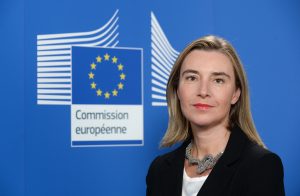The Councils (configurations)
Although in principle the Council is just one institution, in practice it is made up of meetings of different groups of ministers that are known as technical councils, formations or configurations (McCormick, 2011 B, p.189).
There are ten configurations of the Council and each one corresponds to a particular area.. They are attended by ministers from the Member States and the European Commissioners responsible for the areas concerned. Nevertheless, every time a decision is adopted by any of the configurations – it is always seen as a decision of the Council and there is no mention of the configuration.
Since the Lisbon Treaty, Council meetings are web-streamed (except those concerning security matters and foreign policy where no legislation is adopted) and if you would like to see them there are accessible here.
General Affairs (GAC)

General Affairs Council 2011 : Press conference: Mikolaj Dowgielewicz, State Secretary for European Affairs of Poland and President-in-office of the Council 12-09-2011 – Brussels, Belgium.
In this configuration, the General Affairs Council (GAC) deals with issues that are related to more than one policy area such as enlargement or institutional issues
- It helps with the preparation of European Council meetings
- It co-ordinates work of other configurations
Read this article (Kaczynski, P., M., Byrne, A. (2011). The General Affairs Council: The key to political influence of rotating presidencies.) and consider the following questions:
- What are the major challenges facing the Council of Ministers?
- How would reforming the GAC improve the institution overall?
Foreign Affairs
- Deals with the Union’s external actions: common foreign and security policy, foreign trade and development co-operation.
- The High Representative of the Union for Foreign Affairs and Security Policy is the President of the Foreign Affairs Council.

The European Council appointed Federica Mogherini High Representative of the Union for Foreign Affairs and Security Policy / Vice President of the Eu Commission. She is assisted by the European External Action Service (EEAS).
Here you can read more about the role of the High Representative.
Economic and Financial Affairs (ECOFIN)
The Economic and Financial Affairs council (ECOFIN) deal with the following:-
- Composed of Economic and Finance Ministers and Budget ministers when the budget is discussed.
- Adopts the budget of the EU.
- Deals with EU policies such as: economic policy co-ordination, monitoring of member states public finances and budgetary policies, financial markets, capital movements, economic relations with non-member states.
- Decisions are made by: qualified majority (QM) in co-decision or consultation with the European Parliament or, in case of fiscal matters, by unanimity.
Justice and Home Affairs (JHA)
- Brings together the justice and home affairs ministers.
- Adopts directives and regulations over the whole field of justice and home affairs (ensuring the free movement of persons: external border controls, asylum, immigration and the prevention and combating of crime) almost always in co-decision with European Parliament.
- Denmark, Ireland and the UK do not vote on issues related to functioning of the Schengen regime.
If you would like to further investigate the exceptions of the UK, Ireland and Denmark during the JHA meetings, you could read the following article: Adler-Nissen, R. (2009). Behind the scenes of differentiated integration: circumventing national op-outs in Justice and Home Affairs. Journal of European Public Policy, 6(1), 62-80. DOI:10.1080/13501760802453239.
Note: University of Portsmouth students: please login to use this resource. Other students: it is likely that you can access this resource using the login from your own institution. If this is not possible then please use the open access alternative summary of the conclusions of this article.
Employment, Social Policy, Health and Consumer Affairs (EPSCO)
Employment, Social Policy, Health and Consumer Affairs (EPSCO) do the following:-
- Brings together the ministers whose work is related to employment, social protection, consumer protection, health, and equal opportunities issues.
- Decisions are made by Qualifying Majority voting in co-decision with the European Parliament, with social security as an exception, where unanimity is used.
Competitiveness (internal market, industry, research and space)
Competitiveness Council Configuration (COMPET) do the following:-
- Depending on the agenda, the meetings are attended by ministers of Industry, Research or Market.
- Ensures the integration and enhancement of competitiveness and growth into EU policies.
Transport, Telecommunications and Energy (TTE)
Agriculture and Fisheries
Go to the official website of the Council and note what the functions of this Council are.
Environment
Go to the official website of the Council and note what the functions of this Council are.
Education, youth, culture and sport
Go to the official website of the Council and note what the functions of this Council are.
Calendar
| M | T | W | T | F | S | S |
|---|---|---|---|---|---|---|
| 1 | ||||||
| 2 | 3 | 4 | 5 | 6 | 7 | 8 |
| 9 | 10 | 11 | 12 | 13 | 14 | 15 |
| 16 | 17 | 18 | 19 | 20 | 21 | 22 |
| 23 | 24 | 25 | 26 | 27 | 28 | |
Leave a Reply